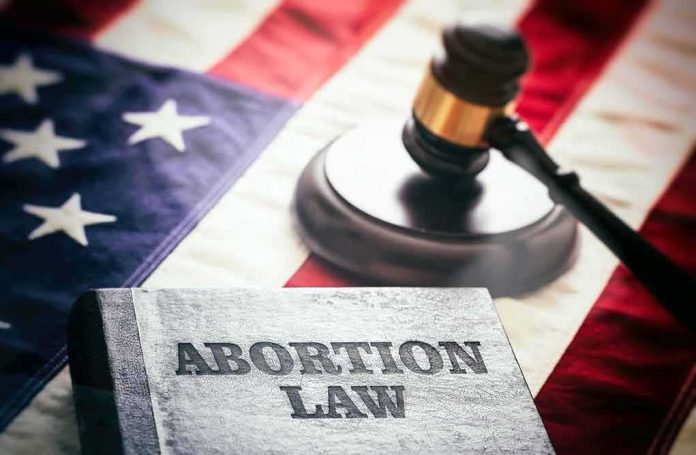
Louisiana’s new abortion laws allow family members to sue abortion pill providers for a minimum of $100,000, effectively criminalizing the drugs as controlled substances while establishing unprecedented legal pathways to punish those involved in facilitating abortions.
Key Takeaways
- Louisiana Governor Jeff Landry signed the Justice for Victims of Abortion Drug Dealers Act, allowing immediate family members to sue those facilitating chemical abortions with minimum damages of $100,000
- Abortion-inducing drugs mifepristone and misoprostol are now classified as Schedule IV controlled substances in Louisiana, making their possession without prescription a criminal offense
- The Stop Coerced Abortion Act criminalizes tactics used to pressure women into abortions, targeting those who force women to terminate pregnancies
- Louisiana maintains strict abortion bans with limited exceptions only for cases where the mother’s life is at risk or the unborn baby won’t survive after birth
- The state has already attempted to extradite a New York abortionist for mailing abortion pills into Louisiana
Family Members Granted Legal Standing to Sue Abortion Providers
Governor Jeff Landry has significantly strengthened Louisiana’s pro-life legal framework by signing the Justice for Victims of Abortion Drug Dealers Act. This groundbreaking legislation empowers immediate family members of preborn children – including the mother, father, grandparents, or the mother’s legal guardian – to pursue civil action against anyone facilitating chemical abortions. The law establishes a minimum penalty of $100,000 for violations, creating a substantial financial deterrent designed to protect unborn children and prevent underground abortion pill distribution networks from operating within state borders.
“We thank Governor Landry for signing HB 575 into law, furthering his lifelong commitment of protecting life and helping moms. The reckless sale of abortion pills by out-of-state businesses has led to increased instances of women being coerced to have abortions. We look forward to HB 575 giving women hurt by abortion the opportunity to seek justice,” said Louisiana Right to Life Policy Director Erica Inzina.
Abortion Drugs Now Classified as Controlled Substances
In a significant regulatory move, Louisiana has reclassified mifepristone and misoprostol – the two primary medications used for chemical abortions – as Schedule IV controlled substances. This classification puts these drugs in the same category as prescription medications with recognized potential for abuse or dependence. The reclassification makes possession without a valid prescription a criminal offense and creates additional legal pathways to prosecute those who mail or transport these substances into the state, effectively closing loopholes that allowed circumvention of the state’s abortion restrictions.
Louisiana’s aggressive stance has already manifested in practical enforcement efforts. State officials have initiated extradition proceedings against a New York-based abortion provider accused of mailing abortion pills to Louisiana residents. This case signals the state’s willingness to pursue interstate enforcement of its abortion restrictions, potentially setting precedents for cross-state legal battles over abortion access. The state’s classification of abortion drugs as controlled substances provides the legal foundation for such enforcement actions.
Criminalizing Coerced Abortions
The Stop Coerced Abortion Act, also signed by Governor Landry, addresses another dimension of abortion – situations where women face pressure or coercion to terminate pregnancies. This legislation specifically targets individuals who use threats, intimidation, or other forms of pressure to force women into unwanted abortions. By criminalizing such behavior, Louisiana aims to protect vulnerable women who may face pressure from partners, family members, or others to end pregnancies against their true wishes.
These new laws complement Louisiana’s existing abortion restrictions, which were triggered by the Supreme Court’s overturning of Roe v. Wade. The state’s comprehensive ban allows abortions only in very limited circumstances – when the mother’s life is at serious risk or when the unborn child has a condition incompatible with life outside the womb. By addressing coercion and the distribution of abortion drugs, these new measures close potential loopholes in the state’s pro-life legal framework.
Criticism and Support for Louisiana’s Approach
Critics have compared Louisiana’s approach to the War on Drugs, suggesting the policies may disproportionately impact marginalized communities. Some academic analyses have characterized these measures as extensions of social control rather than public health initiatives. However, supporters of the legislation, including Louisiana Right to Life, maintain that these laws protect women from exploitation and provide justice for families affected by chemical abortions.
The comprehensive nature of Louisiana’s abortion restrictions reflects the state’s commitment to establishing a strong pro-life legal environment following the constitutional authority returned to states by the Supreme Court. With these new laws addressing chemical abortion, coercion, and establishing clear penalties for violations, Louisiana has created one of the nation’s most robust legal frameworks for protecting unborn life while establishing legal recourse for family members affected by abortion.









